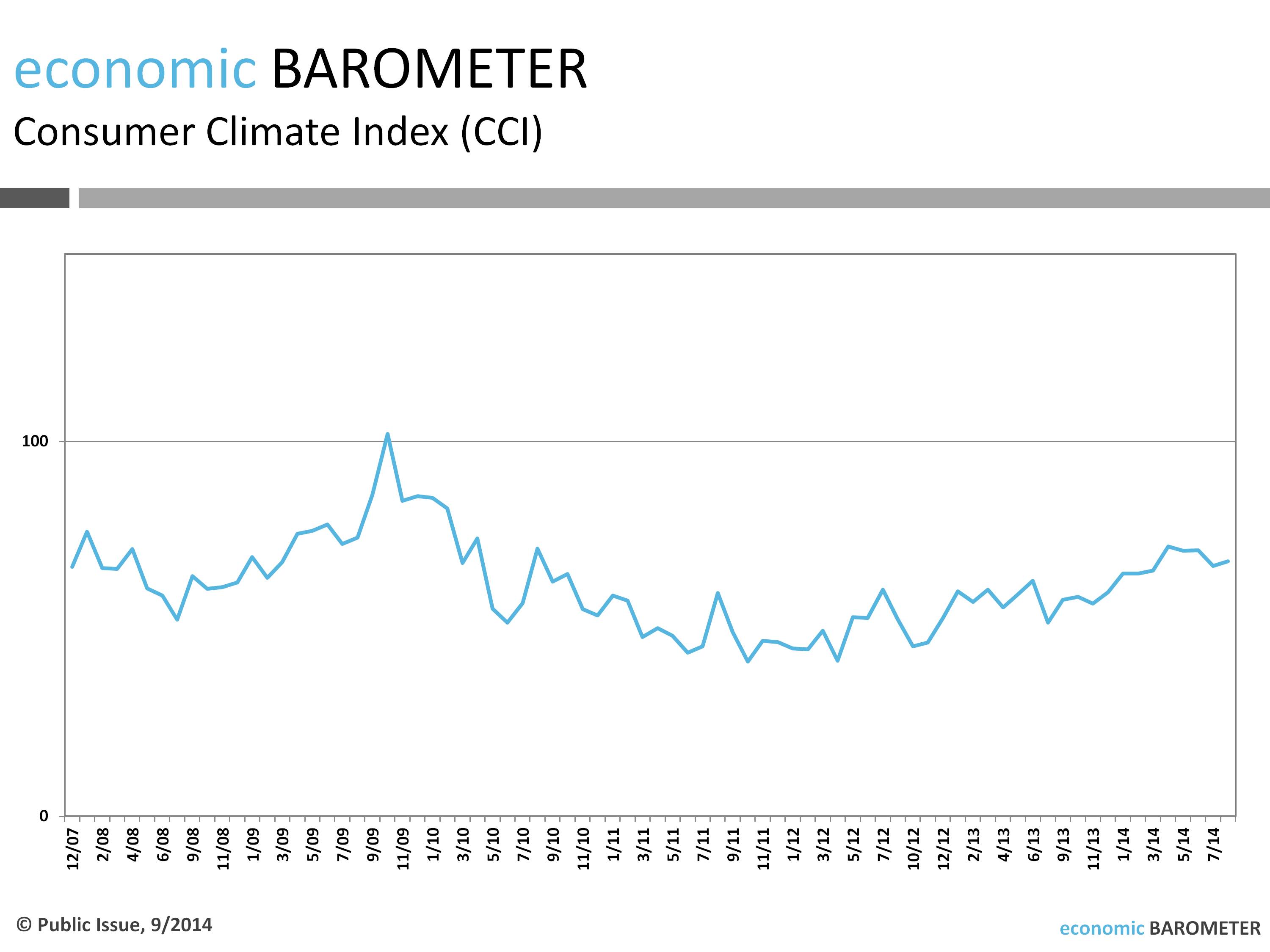Citizens’ assessments of current economic conditions show a slight improvement, while their expectations regarding the future are holding steady. The similarity in the course of consumer sentiment since Euro elections in May with that seen in the period following European elections in 2009 further strengthens the assessment that SYRIZA is widening its lead over New Democracy.

The Consumer Climate Index – CCI (68) rose marginally (+1.2 points) relative to July. The Current Economic Conditions Index – CECI (48.8) registered a slight improvement (+2.7 points) compared to July, while theConsumer Expectations Index – CEI (80.8) remained unchanged. More generally, the Consumer Climate Indexshowed an uptrend from November 2012 up to an including April this year, when it reached its highest level of the “Memorandum period” (72), registering total gains of 26.7 points. However, since May 2014 it has shown no further upward momentum and appears to be stabilizing at around 70 points.
Propensity to buy (65.7) registered an increase (+3.7 points) since July. Roughly 1 in 4 consumers (26%) consider that the current period is appropriate for major purchases of household equipment (furniture, electrical appliances, etc.). Assessments of personal financial situation (31.8, +1.7 points relative to July) remained above the 30-point mark for the fifth straight month. Expectations of personal financial situation (62.3) showed an increase (+1.3 points) relative to the previous survey. Expectations for the economy (70.9 -3.7 points relative to July) have been on a downtrend for the past five months (5/2014-9/2014), with total losses of 9.1 points (from 80 points in April to 70.9 points in September). On the other hand, expectations for the economy during the next five years (109.1) have remained consistently above the “psychological” 100-point barrier for the past 10 months (12/2013-9/2014), registering an increase of +2.8 points relative to July. Citizens’ expectations for their personal financial situation remain at much lower levels than those for the future of the economy. Just 1 in 10 (9%) expect their personal financial situation to improve during the coming year. In contrast, 19% express optimism about the future of the economy over the next 12 months, and when the time span is increased to the next five years, the proportion of those expecting the economy to recover rises to 38%.
Citizens’ expectations for unemployment (64.8) declined marginally (-1.4 points) after plummeting (-9.8 points) in July. The percentage of those expecting unemployment to fall in the coming 12 months decreased to almost 16%, from 17% in July and 22% in June. Expectations for saving and inflation remained at more or less the same level. The percentage of those considering it likely they will be able to save some amount of money in the year ahead remained at 6% for the fourth consecutive month, while just 1 in 10 (11%) anticipate a decrease in prices in the coming 12 months.
Consumer Climate Index and Euro elections
As noted in a previous survey, the victory of the main opposition party (SYRIZA) in recent Euro elections followed a significant rebound of consumer sentiment during the first half of 2014, just as PASOK’s victory in European elections in 2009 came after a period of improvement in consumer confidence early that year. In the four months since Euro elections (6/2014-9/2014), consumer sentiment appears to be stabilizing. Something similar had been observed in the period between Euro elections and parliamentary elections in 2009. More specifically, in the past four months (6/2014-9/2014) the Consumer Climate Index has hovered around the 70-point mark, while in the corresponding period of 2009 it had stabilized at around 75 points. At the same time, the rapid increase in voting intention in favor of SYRIZA, as recorded in all opinion polls published since the Euro elections, is also similar to the rise in estimated voter support for PASOK in the period between European and national elections in 2009. As is clear, developments relating to consumer sentiment and voting intentions in 2014 closely resemble those seen in 2009. This particular observation provides further indication of SYRIZA’s ascendancy over the government and increases the chances of that party winning the next elections.
This post first appeared in Public Issue's website and is republished here with its permission.